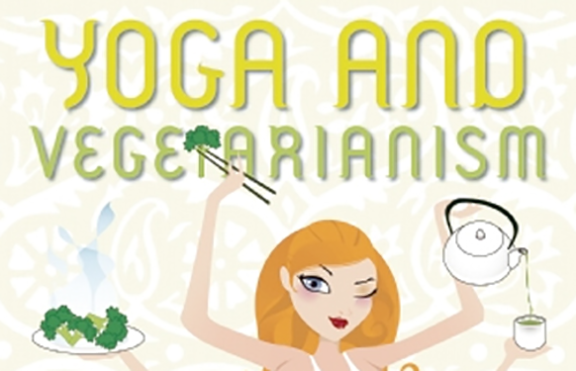 In the Yoga Sutras, Patanjali lays out an eight-limbed plan for liberation called Raja Yoga. The first limb is called yama, which means restraint and includes five ethical restrictions: ahimsa (non-harming), satya (truthfulness), asteya (nonstealing), brahmacharya (continence) and aparigraha (greedlessness). The yamas describe how an unenlightened person who desires Yoga should restrict his or her behavior toward others. What would we find if we were to investigate the yamas in terms of how we are treating the animals we put on our plates every day? Are we harming them? Are we deceiving them? Are we stealing from them? Are we manipulating them sexually? Are we impoverishing them through our greed?
In the Yoga Sutras, Patanjali lays out an eight-limbed plan for liberation called Raja Yoga. The first limb is called yama, which means restraint and includes five ethical restrictions: ahimsa (non-harming), satya (truthfulness), asteya (nonstealing), brahmacharya (continence) and aparigraha (greedlessness). The yamas describe how an unenlightened person who desires Yoga should restrict his or her behavior toward others. What would we find if we were to investigate the yamas in terms of how we are treating the animals we put on our plates every day? Are we harming them? Are we deceiving them? Are we stealing from them? Are we manipulating them sexually? Are we impoverishing them through our greed?
Ahimsa
Ahimsa pratisthayam tat sannidhau vaira tyagah (II.35)
When you stop harming others, others will cease to harm you.
Some contemporary Yoga teachers interpret ahimsa as a directive not to harm yourself, “Don’t be aggressive in your asana practice; be kind to your body,” they say. Or else, “Don’t restrict your diet with extremes like vegetarianism; it might harm you.” If Patanjali had been recommending ahimsa as a way of treating oneself, he would have included it in his list of niyamas [the second limb of Yoga], the observances one should maintain in regard to oneself. The fact that Patanjali placed ahimsa as the first yama, and not among the personal observances, or niyamas, seems vitally significant.
Non-harming is essential to the yogi, because it creates the kind of karma that leads to eternal joy and happiness. According to the universal law of karma, if we cause harm to others, we will suffer the painful consequences of our actions. The yogi, realizing this, tries to cause the least amount of harm and suffering to others possible. Compassion is an essential ingredient of ahimsa. Through compassion, you begin to see yourself in other beings. This helps you refrain from causing harm to them.
Satya
Satya pratishthayam kirya phalashratyatvam (II.36)
When one does not defile one’s speech with lies, then the words that one says will be listened to and acted upon in a positive and immediate manner.
Most of us say we want peace, equality and freedom for all, but our actions say something entirely different as we bite into a hamburger or order an ice-cream cone, wear a fur coat to an anti-war demonstration or serve hot dogs to our children. Once you become more aware, there’s simply no way to not notice these everyday hypocrisies, these gaps in awareness.
As Yoga practitioners, we come to a time in our lives when we begin to question whether what we have been told is true, including the assumptions we hold about ourselves and the world around us. The fact that you have begun a Yoga practice is evidence that you have the courage to embark on a deep self-reflective quest. Through steady practice (abhyasa), you will experience for yourself what is true, and all the lies you have been told, even those that you have told, will fade away in the light of the greater truth of your true potential.
As we embrace the practice of satya, our speech becomes purified and we are able to fearlessly say what we mean and mean what we say. Others cease lying to us and begin to perceive us as people with integrity; they listen to us and take our words seriously. Some meat eaters have been convinced that what they do doesn’t really matter in the larger scheme of things. Part of the process of transitioning into living more honestly is to hold yourself accountable for the things you do.
Asteya
Asteya-praitishthayam sarva-rotnopasthanam (II.37)
When one ceases to steal from others, prosperity (material, mental and spiritual) appears.
The meat, dairy, and fashion industries are founded upon stealing—stealing milk intended for a mother’s new baby, stealing wool intended to keep someone warm, stealing skin and fur intended to be worn by the being who was born into that skin. To confine an animal for its entire life is to steal its life. To kill and eat animals is to steal their lives from them.
The ultimate truth is that the animals never entered into any agreement to be bought and sold. We have been stealing their lives for our own selfish reasons. According to Patanjali, this is not conducive to our material, mental and spiritual prosperity. This is how karma works. When we steal, we set into motion dire karmic consequences that affect our future well-being.
Can we afford to care about the suffering of animals when so many human beings are starving? Yes, not only because caring about animals does not preclude caring about human beings, but because vegetarianism is of direct benefit to the planet and to reducing starvation around the world. A human child dies of malnutrition every two seconds on this planet, yet if just ten percent of American meat eaters adopted a vegetarian diet, there would be twelve million more tons of grain to feed to humans—enough to support the sixty million people who starve to death each year. When we come to understand the true benefits that come from the practice of asteya the means to abolish human starvation will be realized and all will have enough to eat.
Brahmacharya
Brahmacharya-pratishthayam virya-labhah (II.38)
When one does not misuse sexual energy one obtains enduring physical, mental and spiritual vitality resulting in good health.
Patanjali tells us very clearly that health and vitality will come to one who is established in brahmacharya; to one who treats sexuality with reverence. If we want to be healthy, we must consider the suffering, disease and ill health we are causing to the animals we eat. Can we really expect to be healthy by causing so much disease in the lives of others?
Meat eating could be seen as a feminist issue; for if we believe in women’s rights, we cannot condone and support the way female animals are exploited for milk, eggs and babies. Most of the animals in our factory farms are female because they are the most exploitable, as they can provide milk as well as more babies. This has historically been the case in agriculture. Our culture is based on the exploitation of the feminine (Mother Nature), and so the eating of meat, eggs and dairy products are an integral part of our system. If we feel that women should be treated fairly, then we must extend our desire for women’s liberation to all women regardless of race, religion, or species. Yoga teaches us that what we do to others we ultimately do to ourselves. If we do not respect the rights of females of other species, how can we expect to successfully liberate human females. When we talk about veganism and the practice of brahmacharya, we are definitely talking about a radical sexual revolution.
Aparigraha
Aparigraha-sthairye janma-kathamta-sambodhah (II.39)
When one becomes selfless and ceases to take more than one needs, one obtains knowledge of one’s future birth.
Through the practice of greedlessness, a yogi transcends linear time and is able to be free of wants. When we begin to contemplate the potential infinite results of our actions, we may begin to reflect on whether or not we can karmically afford certain actions. Real needs are not wrong; wants, on the other hand, can become problematic. We are in the midst of a global crisis caused by insatiable human greed. The more we have, the more we want. Influenced by media imagery and advertising, we have become habituated to look outside of ourselves for happiness and, in the process, have created powerful addictions that drive our choices. Each time we allow an outside stimulus to program our actions, we allow our own inner power of discrimination to atrophy a bit, leading to further addiction. A yogi practices self-reflection. This gives rise to viveka (discrimination), out of which arises wisdom, which leads to making choices that lead to enlightenment—not into deeper ignorance.
The consequences for the survival of many animal species, as well as our own, are dire. The directive aparigraha, in contrast, helps one curb one’s actions in accordance with what is good for all. Through aparigraha, we begin to understand ourselves as holy beings who thrive as part of a whole organism, working together for common benefit. We begin to feel our unique contribution to the wholeness of life. We come to understand that what we do is not small or insignificant to the lives of others or to the planet, but reverberates through every living being through time and space eternally. We become truly Self-conscious as we begin to realize ourselves as part of the greater whole of life and understand our destiny.
Eating is the most fundamental basis for our life as it creates and maintains our physical body, without which we would have no life. The choice to eat a vegetarian /vegan diet will do more to revolutionize our bodies, minds and spirit and bring about world peace than any other single act, because it powerfully effects change in the outside world through enacting that change from deep within our own bodies. Such change will put into motion a profound planetary revolution, because it makes other-centeredness, not self-centeredness, the number-one priority.
Through the practice of Yoga, I have learned something about karma and have come to realize that how we treat others will determine our own reality. That is what ultimately motivated me to become a Yoga teacher as a way to share the benefits of vegetarianism with others who are interested in the path of enlightenment.
 About the Author:
About the Author:
Sharon Gannon, together with David Life, created the Jivamukti Yoga Method, which focuses on teaching and practicing Yoga as a means to enlightenment. The Jivamukti Yoga Method is taught world-wide in Jivamukti Yoga centers independently owned and directed by students of Gannon and Life. These centers are in Munich, London, Toronto, Detroit and the West Village of NYC. Sharon is an animal-rights activist and outspoken advocate of ethical veganism. Sharon is the author of several books, including Yoga and Vegetarianism, from which this article is excerpted, with permission.

